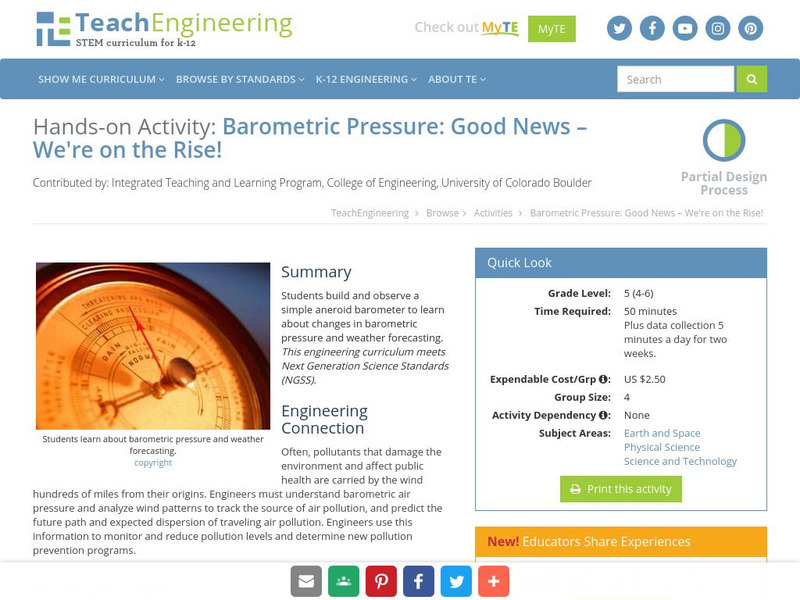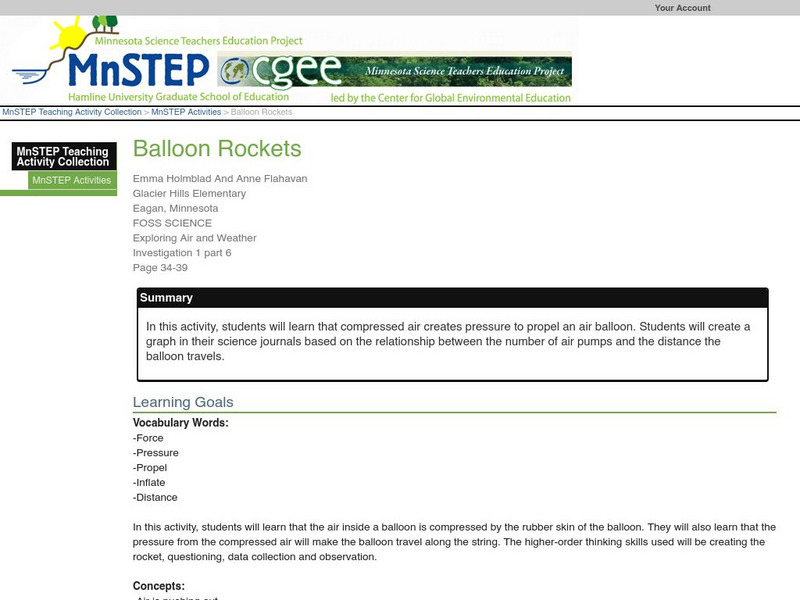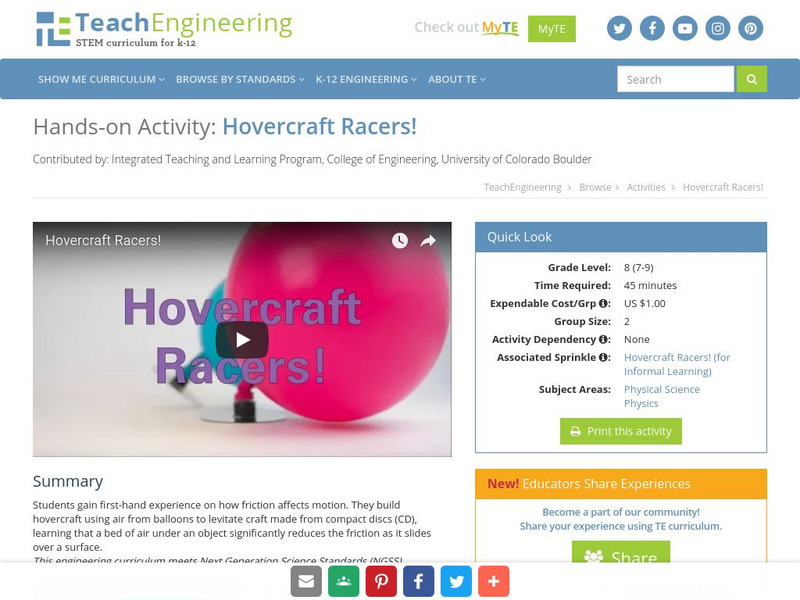ClassFlow
Class Flow: High and Low Pressure Systems
[Free Registration/Login Required] This flipchart provides an opportunity to sort high and low pressure system characteristics using a graphic organizer. Activote activity provides assessment of student learning.
PBS
Pbs Teachers: Balloon & Straw Experiment
Investigate air pressure, motion and the forces of air currents using a bendy straw, a balloon and a rubber band.
PBS
Pbs Teachers: Card Lift Experiment
Demonstrate air pressure by using index cards to defy gravity.
American Geosciences Institute
American Geosciences Institute: Wind Classroom Activities
When air is warmed, it expands and becomes less dense. As the air becomes less dense, its air pressure decreases. This occurs because molecules in warm air have greater kinetic energy (energy of motion) than in cold air. As the molecules...
PBS
Pbs Kids: Dragonfly Tv Do It: Balloon Hovercraft
PBS site allows you to discover how air pressure works as you learn how to build your own hovercraft.
TeachEngineering
Teach Engineering: What's Air Got to Do With It?
Students are introduced to the concepts of air pollution and air quality. The three lesson parts focus on the prerequisites for understanding air pollution. First, students use M&Ms to create a pie graph that expresses their...
Science and Mathematics Initiative for Learning Enhancement (SMILE)
Smile: Does Air Really Exist?
Given a teacher demonstration and various learning stations, the students learn that air is a real substance which occupies space, exerts pressure, and has weight.
NASA
Nasa: Gas Properties Definitions
Use this site to learn about basic gas properties including motion, viscosity, and compressibility. Includes links to activities for all ages.
McREL International
Mc Rel: Whelmer #12 Learning Activity: Bernoulli Cans
An easy to do activity that investigates Bernoulli's principle. The activity is presented in lesson plan format that meets NSES standards.
TeachEngineering
Teach Engineering: Fun With Bernoulli
While we know there is air around us all the time, we normally do not notice the air pressure. The purpose of this is activity is to use Bernoulli's Principle to manipulate air pressure so we can see its influence on the objects around us.
TeachEngineering
Teach Engineering: Good News We're on the Rise!
Students build and observe a simple aneroid barometer to learn about changes in barometric pressure and weather forecasting.
University Corporation for Atmospheric Research
Ucar: Not Your Usual Pop!
Students learn how to crush a can with only air pressure.
Science Education Resource Center at Carleton College
Serc: Balloon Rockets
In this activity, students will learn that compressed air creates pressure to propel an air balloon. Students will create a graph in their science journals based on the relationship between the number of air pumps and the distance the...
Texas Instruments
Texas Instruments: The Inverse Relationship Between Pressure and Volume
In this activity, students' will use a pressure sensor to investigate the relationship between pressure and volume for an enclosed air sample, and fit an inverse function model to the pressure versus volume data.
University Corporation for Atmospheric Research
Ucar: Balloon on a Bottle
In this activity, students brainstorm various ways that an uninflated balloon placed over a bottle's opening can be inflated without touching the balloon.
TeachEngineering
Teach Engineering: Weather Watchers
Learners are introduced to some essential meteorology concepts so they more fully understand the impact of meteorological activity on air pollution control and prevention. First, they develop an understanding of the magnitude and...
Other
60 Second Science: Air Putting It to Work
Investigate the properties of air. Observe the water vapor present in our exhaled breath.
The Franklin Institute
Franklin Institute Online: Make Your Own Barometer
At this site from the Franklin Institute Online, you are given instructions how to make a simple barometer as part of an activity in which you make a weather station for observation.
NASA
Nasa: Beginner's Guide to Aerodynamics
Includes exhaustive information and a wealth of activities pertaining to aerodynamics and the physics of flight.
Museum of Science
Museum of Science and Industry: Online Science: Activities: Pop Rockets
An experiment where students launch a simple rocket using a film canister, water, and an antacid tablet.
TeachEngineering
Teach Engineering: Hovercraft Racers!
Students gain first-hand experience on how friction affects motion. They build a hovercraft using air from a balloon to levitate a craft made from a compact disk (CD), learning that a bed of air under an object significantly reduces the...
Dan Satterfield
Dan's Wild Weather Page: Winds
Find out about wind and jet streams and the tools that measure them.
PBS
Pbs Teachers: Zoom Vehicle
Explore forces of motion and properties of gasses by building a vehicle that runs along a string track powered by air pressure.
PBS
Pbs Teachers: Collapsing Bottle Experiment
Explore the effect of changing temperature on air pressure using a plastic soda bottle.





















